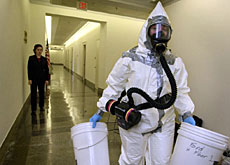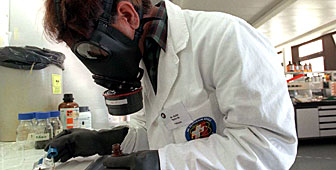Switzerland prepares for bioterrorism threat

Switzerland is stepping up its efforts to protect civilians against a possible terrorist attack using biological weapons.
Medical authorities are on standby to set up vaccination centres throughout the country against smallpox, a highly contagious virus, should the need arise.
Dozens of volunteers who are due to undertake disaster relief work in or near Iraq have been already been vaccinated against smallpox in a clinical trial in the past months.
The immunisation programme could be expanded to involve doctors in Switzerland in case of an attack, medical authorities say.
“If there is an increased threat of smallpox, then we would immunise more doctors who would establish secondary immunisation centres throughout Switzerland,” Professor Robert Steffan, head of Zurich University’s vaccination centre, told swissinfo.
The smallpox virus is extremely contagious and kills between 20 and 40 per cent of those who are not vaccinated.
No immediate threat
Despite the measures, Steffan insists there is no immediate threat of a bioterrorist attack involving smallpox.
“We are getting prepared to immunise the population if necessary, but there is no reason to run the risk of immunising the general population,” he says.
“There has not been a single case of smallpox anywhere in the world for the last 25 years.”
If other biological agents were introduced into the country, Steffan said much would depend on whether Switzerland had a vaccine available to immunise the population, or whether it could buy it from abroad.
“Today it is extremely difficult to buy the anthrax vaccine on the international market,” he said. “Practically speaking there is an embargo and the most you can obtain is a few doses at very high prices.”
Special commision
In the weeks following the September 11 attacks in the United States, Bern established a crisis centre called “Commission B” to identify, examine and draft measures to deal with an attack involving chemical and biological weapons.
The Commission is made up of cantonal representatives, the Swiss army, the Federal Health Office and the Spiez Laboratory – Switzerland’s main weapons institute.
It set out five likely scenarios.
The first involves a biological attack on Switzerland or its neighbours involving the deadly anthrax bacteria. Smallpox is designated as the next “most probable” scenario.
The other three scenarios include botulism, the bubonic plague and tularaemia.
Virus
Authorities say the type of protective measures they would take will depend on the type of virus, bacteria or pathogens used by terrorists to attack Switzerland.
The smallpox virus, though, is the biggest worry for many of Switzerland’s infectious disease specialists.
“What’s really terrifying is not the arrival of a genetically modified virus, but the savage smallpox virus,” warned Pierre-Alain Raeber, responsible for monitoring infectious diseases of the Federal Health Office.
The virus is officially limited to centres in Russia and the US, but American officials admit that it is also in the hands of a dozen “potential terrorist” countries.
The Geneva-based World Health Organization has responded to the threat by creating a command centre for vaccinations against smallpox.
Smallpox
Switzerland acquired in 2002 – for SFr11.8 million ($8.56 million) – three million doses of smallpox vaccines produced between 1970 and 1980, and deposited them in a pharmacy at a military base in Ittigen, canton Bern.
The last case of smallpox diagnosed in Switzerland dates back to 1932 and vaccinations were halted at the end of the 1970s.
Since then, only the Vaccination Centre in Zurich has been able to work on the smallpox vaccine.
“From here, we could learn about the vaccine and immunisations,” explained Raeber.
Vaccination centre
The vaccination centre at the Hospital of Geneva is also operational and there are plans to construct other centres capable of conducting mass vaccinations.
“Parallel to this, we have been trying to improve the effectiveness and security of the old vaccine,” Raeber told swissinfo.
Volunteers from the Geneva clinic have reacted very well to trials, and diluted versions of the vaccine were also tested with the aim of reducing side effects.
The three million doses are ready to be administered but authorities are trying to vaccinate the least number of people to “avoid the pitfall of side effects since it can do more harm than good”, said Raeber.
One vaccinated person in a thousand suffers from side effects and the vaccine can prove fatal in one in a million cases.
swissinfo, Isabelle Eichenberger (translation: Samantha Tonkin)
A week after September 11, Switzerland created “Commission B” which comprises of cantonal experts, the Swiss army, the Spiez Laboratory and the Federal Health Office.
Its mandate is to identify, examine and communicate information on the dangers of bioterrorism.
Commission B operates on the basis of five bioterrorism scenarios: anthrax, smallpox, plagues, botulism and tularaemia.
The Spiez Laboratory is at the heart of Switzerland’s research programme into nuclear, chemical and biological weapons.

In compliance with the JTI standards
More: SWI swissinfo.ch certified by the Journalism Trust Initiative












You can find an overview of ongoing debates with our journalists here . Please join us!
If you want to start a conversation about a topic raised in this article or want to report factual errors, email us at english@swissinfo.ch.